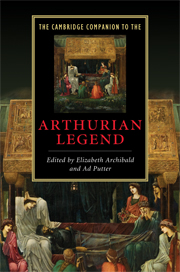Book contents
- Frontmatter
- Introduction
- Part I Evolution
- 1 The early Arthur: history and myth
- 2 The twelfth-century Arthur
- 3 The thirteenth-century Arthur
- 4 The fourteenth-century Arthur
- 5 The fifteenth-century Arthur
- 6 The Arthur of the sixteenth to nineteenth centuries
- 7 The Arthur of the twentieth and twenty-first centuries
- Part II Themes
- Further Reading
- Index
6 - The Arthur of the sixteenth to nineteenth centuries
from Part I - Evolution
Published online by Cambridge University Press: 28 March 2010
- Frontmatter
- Introduction
- Part I Evolution
- 1 The early Arthur: history and myth
- 2 The twelfth-century Arthur
- 3 The thirteenth-century Arthur
- 4 The fourteenth-century Arthur
- 5 The fifteenth-century Arthur
- 6 The Arthur of the sixteenth to nineteenth centuries
- 7 The Arthur of the twentieth and twenty-first centuries
- Part II Themes
- Further Reading
- Index
Summary
Great writers tend to impress and also debilitate their successors. Malory exemplifies this, with six separate editions of Le Morte Darthur by 1634 and no innovative treatment of Arthur and his world in the same period. In his case - as probably also with others like Chaucer, Shakespeare and Scott - there were more reasons for the diminuendo than mere anxiety of influence. One was focused on history. British scholars, notably the Scots, were increasingly doubtful of Geoffrey of Monmouth's account of Arthur: after Polydore Vergil's clear-headed dismissal of any historical standing in 1534, only committed Arthur loyalists like John Leland, writing in Latin in 1544 (translated into English in 1582), accepted the full story, and their numbers steadily reduced, though the position survived into the eighteenth century. Another source of Arthurian doubt was the increasing value given to classical learning over medieval tradition: Aeneas had become a more credible nation-builder than Arthur. At the same time the new style of Tudor administrative organisation (like Caxton's Le Morte Darthur stemming from 1485), with a standing army, ministers of state and the development of something like a civil service, made the idea of a king ruling through his great warriors with advice from a magical grand vizier seem both improbable and irrelevant. Protestantism itself recoiled from Arthur's Catholic ambience, especially the Grail story, and Puritan moralism found the cheerful violence and sexual awareness of romance unappealing - Roger Ascham famously summed Malory up in 1570 as 'open mans slaughter and bold bawdrye'.
- Type
- Chapter
- Information
- The Cambridge Companion to the Arthurian Legend , pp. 103 - 119Publisher: Cambridge University PressPrint publication year: 2009
- 2
- Cited by

